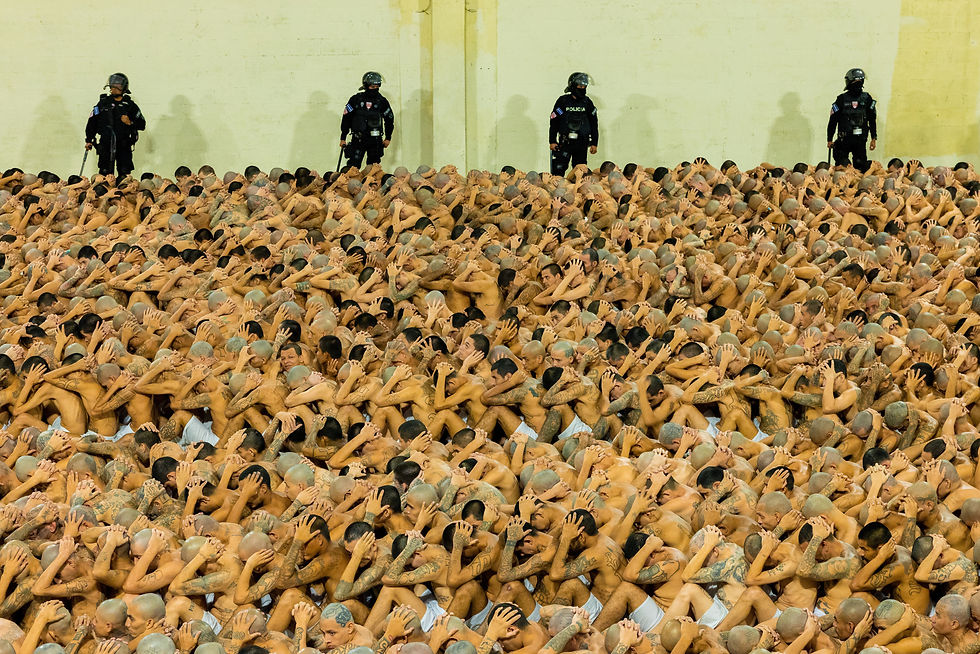The World’s Coolest Dictator
- May 19, 2023
- 4 min read
Cody Searl | Latin America Fellow
El Salvador was once called the murder capital of the world. Home to two of the world’s largest criminal organisations–MS-13 and its rival gang Barrio 18–homicide rates reached a staggering 105 per 100,00 people in 2015. Until recently, many Salvadoran neighbourhoods have resembled war zones–houses and businesses lay abandoned, and residents who can’t or won’t flee their homes pay huge sums in protection money. As a Salvadoran father told an El País journalist: “this country seems as though a biblical curse has fallen upon it, and here we will be to bear it.”
Enter the self-proclaimed “world’s coolest dictator”. In 2019, Nayib Bukele was elected president of El Salvador, becoming the region’s youngest head of state at 37. A former marketing executive often sporting skinny jeans, aviators and a baseball cap, Bukele was seen as a modern, innovative leader who could run the country like a CEO. Less than a year later, he marched armed police and military troops into the country’s Legislative Assembly, threatening to forcibly remove any lawmakers opposed to his war on gangs. And Salvadorans love him.
There is a saying in El Salvador: “to imagine an El Salvador without gangs was like imagining an ocean without water.” But draining El Salvador of gangs is exactly what Bukele is doing. Since implementing a state of emergency in March 2022, Bukele’s military crackdown has led to over 65,000 arrests of suspected gang members. In March, he extended the emergency measures for a twelth time, the same day he sent another 2000 prisoners to his newly built ‘megaprison’–the largest in the Americas with the capacity to house 40,000 inmates.
The ongoing state of emergency has human rights activists alarmed. In El Salvador, police and soldiers can now detain people indefinitely without cause, and with no rights to due process or legal defence. Many young men have been arbitrarily arrested based on their physical appearance or for living in low-income neighbourhoods. Cristosal, a local human rights group, documented 3,344 cases of human rights abuses in the first 11 months of the crackdown, while at least 80 inmates died in unclear circumstances between March and October last year.
Meanwhile, El Salvador’s institutions are buckling under the weight of Bukele’s millennial authoritarianism. Combining traditional strongman tactics with a social media-driven personal brand, he is concentrating executive power, has restricted freedom of assembly rights, stacked El Salvador’s courts with ‘yes men’, and frequently intimidates opposition groups and the media. The newly installed supreme court has ruled he can run for election in 2024, despite El Salvador’s constitution prohibiting consecutive presidential terms.
According to polls, the vast majority of Salvadorans think these abuses are a price worth paying. Bukele’s iron-fisted security policy has led to an incredible decrease in homicides–down to 7.8 per 100,000 people according to government figures. El Salvador’s streets are springing back to life, and as Victor Manuel Vasquez, a 45-year-old father from the capital San Salvador explained: “For the first time, the world looks to us as an example and not with pity or fear.”
Indeed, Bukele’s international fan club is growing. Pro-Bukele marches have been held in Guatemala, Honduras, and Chile, and government or opposition leaders in Costa Rica, Colombia, and Peru have promised to follow in Bukele’s footsteps if given the chance. In February, Honduras extended and expanded its state of emergency; a move taken straight from Bukele’s playbook. Even in once-tranquil Chile, “sixty-two per cent of Chileans are ready to give up freedoms to control the violence” according to Santiago Mayor Evelyn Matthei.
According to Freedom House, freedom in the Americas declined in 9 countries in 2022. Across Latin America, violence–often linked to organised crime–is on the rise. The failure of conventional security policies to address the problem is contributing to ‘democratic fatigue,’ and the allure of strongmen promising simple, radical fixes. Fed up with high crime rates, rising social and economic problems, and governments perceived as corrupt or ineffective, the appeal of authoritarian populism is growing from Mexico to Peru.
Charismatic leaders like Bukele offering quick, simple fixes are dangerous. Bukele’s strategy of militarised policing, mass imprisonment, and secretive deals with gang leaders (an accusation Bukele denies), bares strong resemblance to prior Salvadoran government policies throughout the 2000s. Without addressing the structural causes of gang violence, these policies only achieved short-term reductions in crime. Some experts argue that the ‘hellish’, overcrowded prisons that result provide the optimal conditions for recruitment and consolidation of gang power. Once brokered truces break down or the rule of law is restored, the cycle of violence repeats itself.
In contrast, El Salvador’s democratic backsliding under Bukele may endure much longer. Bukele continues to silence dissent and dismantle the institutions designed to check presidential power–portraying human rights and the rule of law as small prices to pay for security. Once these political rights and freedoms are lost they are hard to regain, as recent history in Venezuela and Peru demonstrates.
Instead, Bukele’s opponents must offer a democratic alternative to El Salvador’s security crisis. To achieve long-term progress, preventative strategies must address the socioeconomic drivers of gang formation. This requires investing in social and economic opportunities for young Salvadorans, and rehabilitation programs that provide former gang members employment and education. The rule of law must be strengthened–not eroded–so the judiciary has the resources and independence to truly begin dismantling gangs and the illicit economies that fund them.
This approach will take more time, more resources, and will be more difficult to sell to a population suffering from democratic fatigue. But in Bukele’s El Salvador, political rights are lost equally by the innocent as they are the guilty. People must ask themselves: where will they turn when a soldier knocks on their door?




Comments